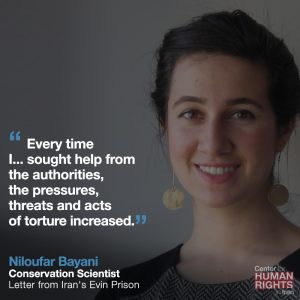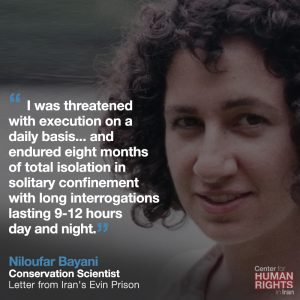Interrogations in Iran’s Judicial Systems: Law vs. Reality
 Iran’s judicial system allows detainees and prisoners to be subjected to harsh and inhuman interrogations without access to counsel and with impunity for interrogators and other judicial officials.
Iran’s judicial system allows detainees and prisoners to be subjected to harsh and inhuman interrogations without access to counsel and with impunity for interrogators and other judicial officials.
First-hand accounts of being interrogated in Iranian prisons and detention centers have been documented by the UN and human rights groups and are available online in Persian and English.
What they all have in common are descriptions of unlawful and inhuman tactics that are used to extract false “confessions” in violation of international standards of due process.
In addition to physical assaults, sexual humiliation, and verbal abuse, tactics used to extract false statements from detainees include prolonged interrogation sessions—despite laws and regulations prohibiting such practices.
State Agents Allowed to Interrogate Defenseless Detainees with Impunity
According to Iranian law, preliminary interviews of alleged suspects should be handled by a judicial investigator, yet detainees facing politically motivated charges and prisoners of conscience in Iran are usually immediately interrogated by security and intelligence agents who act as “judicial associates.”
 In the 2013 version of Iran’s Code of Criminal Procedure, Article 98 stated, “The investigator should personally carry out inquiries and take necessary actions to gather proof that a crime has taken place.”
In the 2013 version of Iran’s Code of Criminal Procedure, Article 98 stated, “The investigator should personally carry out inquiries and take necessary actions to gather proof that a crime has taken place.”
However—with the exception of cases in paragraphs A (crimes punishable by death), B (crimes punishable by life in prison), C (crimes punishable by amputation…) and D (crimes punishable by fourth-degree punishments or higher) of Article 302—interrogations and investigations of witnesses and informed individuals, as well as the collection of information and evidence, or any other legal actions needed to uncover a crime can be legally referred to “judicial associates.”
Up until 2015, state investigators only assumed the role of judicial associates in cases involving freedom of speech and expression issues at their core.
Then in 2015, a note was added to Article 98 in the 2015 amended version of the Code of Criminal Procedure that extended the state investigator’s power to cases involving paragraphs A, B, C, and D.
Since then, judicial associates—who according to Article 29 of the latest Code of Criminal Procedure can be agents from the Intelligence Ministry, the Islamic Revolutionary Guard Corps’ (IRGC) Intelligence Organization, and the Basij militia organization, as well as the police—have been deputized to carry out initial inquiries and interrogations for all cases involving politically motivated charges, such as those involving peaceful civil rights activists, dissidents, and prisoners of conscience.
1,000+ Hours of Interrogations Without a Lawyer
According to first-hand accounts by former political prisoners, the most common arbitrary practice by state investigators is the practice of conducting prolonged interrogation sessions.
This occurs while detainees are denied access to counsel and also often contact with family members.
On March 11, 2021, the daughter of detained Iranian-German dual national Nahid Taghavi said in an interview that her 66-year-old mother had been interrogated for more than 1,000 hours in Evin Prison.
Previously, in January 2019, imprisoned conservationist Niloufar Bayani revealed she had been subjected to 1,200 hours of interrogation.
Such behavior by investigators and interrogators is unconstitutional and a violation of domestic Iranian laws.
Interrogations and Iranian Law
Article 22 of the Constitution states, “The dignity, life, property, rights, residence, and occupation of the individual are inviolate, except in cases sanctioned by law.”
Article 37 emphasizes that “Innocence is to be presumed, and no one is to be held guilty of a charge unless his or her guilt has been established by a competent court.”
Also based on Article 38, “All forms of torture for the purpose of extracting confession or acquiring information are forbidden. Compulsion of individuals to testify, confess, or take an oath is not permissible; and any testimony, confession, or oath obtained under duress is devoid of value and credence. Violation of this article is liable to punishment in accordance with the law.”
Moreover, Paragraph 9 of the Law on Respecting Legitimate Freedoms and Protecting Citizens Rights stipulates that “Subjecting suspects to any form of torture for the purpose of extracting confessions, or forcing a suspect into any other action, is prohibited and confessions extracted in this manner will be invalid in the eyes of the Sharia and common law.”
In addition Article 60 of the Code of Criminal Procedure, states, “Coercing or cajoling a reluctant witness, and using indecent language, or asking misleading, deceptive or irrelevant questions during interrogation are prohibited and the answers given under such circumstances are invalid.”
Basic Rights Routinely Denied
Detainees have certain rights that are often ignored in cases involving “national security” charges, which are often laid against peaceful activists and dissidents:
1) The right to remain silent: Article 197 of the Code of Criminal Procedure stipulates, “A suspect can choose to be silent.”
However, invoking this right is often met with ridicule or violent reactions towards the detainee by the judicial associates.
2) The right to legal counsel: Article 190 of the Code of Criminal Procedure gives suspects the right to obtain a lawyer and emphasizes that “suspects should be informed of this right at the start of the investigator’s inquiries and before charges are read. If the suspect is summoned, the right to a lawyer must be stated on the warrant. After being informed of the charges against a suspect, the lawyer can make statements to clarify the truth or to defend his client and seek the implementation of the law where necessary.”
In reality, detainees accused of politically motivated national security crimes are held for long periods without any contact with lawyers or family members.
When they are allowed to seek legal assistance, they can only pick lawyers from a list approved by the judiciary based on Article 48 of the same law.
3) Ban on deceptive questioning: Article 195 of the Code of Criminal Procedure not only prohibits “misleading, deceptive or irrelevant questions” but also gives lawyers the right to be present and object to such questions during interrogation.
However, this is rarely possible as detainees are usually denied legal representation during questioning and interrogations.
Interrogators Operate with Impunity
In December 2020, former political prisoner Mahdieh Golroo tweeted a photo of her former interrogator Ali Hemmatian after she recognized him in a televised gathering of officials meeting with Supreme Leader Ali Khamenei.
“His (code) name is ‘Raoof.’ He was an interrogator for the IRGC’s Sarallah Headquarters in Ward 2-A (in Evin Prison),” she wrote, adding, “I have filed a suit against him… in Sweden because of his recent threats. The outcome is not important, rather it’s a duty to expose the interrogators and others who have destroyed the lives of many.”
A former political prisoner who wished to remain anonymous told HRANA in December 2020: “Raoof had a leather belt which he always used when he wanted to start hitting me. He would continue to hit me like a madman without any reason, sometimes for 10 minutes, and then he would beat me and insult me and my family.”
To date, no interrogator has been held legally accountable for violating a detainee’s rights in Iran.
Female Detainees Abused by Male Interrogators
Based on Article 42 of the Code of Criminal Procedure, “Interrogations and investigations regarding women and underage individuals should be conducted when possible by trained female judicial associates in accordance with the principles of Sharia law.”
The Iranian judiciary has hired female judicial associates, yet women arrested for peaceful political or civil activities are always questioned by male interrogators.
Some female political prisoners have detailed the mental and physical abuse they have suffered at the hands of their male interrogators.
 In her letter from prison to the supreme leader in February 2019, conservationist Niloufar Bayani said seven armed men took her to a villa in Lavasan, North Tehran, and forced her to “watch them engage in immoral and un-Islamic behavior in a private swimming pool.”
In her letter from prison to the supreme leader in February 2019, conservationist Niloufar Bayani said seven armed men took her to a villa in Lavasan, North Tehran, and forced her to “watch them engage in immoral and un-Islamic behavior in a private swimming pool.”
In another letter to the head of IRGC’s Ward 2-A in Evin Prison in January 2019, Bayani wrote: “During long interrogations” agents “repeatedly made the most filthy sexual insults… in detailed, disgusting, imaginary situations and wanted to [force me] me to complete their sexual fantasies.” Stressing it was pointless to complain to the authorities, she added: “Shockingly, every time I exposed this behavior and sought help from the authorities, the pressures, threats and acts of torture increased and they repeatedly told me… not to do anything to irritate the regime.”
The State and the Law
Many factors diminish the rights of detainees during preliminary inquiries and the interrogation process in Iran’s judicial system.
Some are logistical: As long as the state continues to hire untrained investigators who are uninformed about detainees’ constitutional rights, detainees will continue to be harmed by interrogators operating with impunity.
Some of the problems are structural: Lack of accountability for breaking laws or failing to implement the laws in full has become the norm in Iran, undermining the effectiveness of the few existing constructive laws and regulations that forbid unlawful interrogations.
Most importantly, there are too many Iranian domestic laws that explicitly and blatantly violate international humanitarian principles.
The rule of law in the Islamic Republic of Iran often translates into crushing the universal rights of citizens through legal means.
Effective remedies include:
1) Amending Article 98 of the Code of Criminal Procedure to require judicial investigators to personally be responsible and accountable for independent inquiries and interrogation of suspects in human rights cases, which would end the practice of deputizing this task to security agents.
2) Removing the Note to Article 48 of the Code of Criminal Procedure in order to allow suspects to hire lawyers of their choice on the basis of Article 35 of the Constitution which states, “Both parties to a lawsuit have the right in all courts of law to select an attorney.”
3) Guaranteeing basic rights such as the right to remain silent and the right to defend oneself.
4) Amending Article 29 of the Code of Criminal Procedure to end the influential role of security, intelligence and military agents in judicial processes.
Read this article in Persian.






